But this entry is not about those Parker Brother juggernauts. My own parents always tended to gift me with something very different. My house was a haven for fun educational games which encouraged intellect and skill. And I want to share a list of my favorites with you. The items listed below are both fun and classic. They may be simple or have few pieces, but can create fabulously complex games. And most importantly, many of them are things you can do with children who have just started grade school.
10) Fluxx

I am sure there are people out there who don't consider Fluxx to be terribly educational. And for the most part, they're right. But it's certainly a lot of fun, and it does have that wonderful side effect of telling folks that sometimes, life just isn't fair! Aside from that though, here's a great way to talk to your kids about goals and rules. Why are they different now than before? What do you have to do to accomplish this goal. A crazy card game for those of us with ADD.
9) Bananagrams
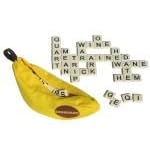
Bananagrams is Scrabble for people who don't like interacting with others. You can play in a group, but it's just as easy to play this game by your lonesome. Use Bananagrams' 144 letter tiles to create your own free-form Scrabble board. It's actually a LOT of fun to play. There IS however a lot of luck involved in which tiles you pick. But what better way to learn more about spelling and arranging words? Even the carrying case is in the shape of a cute banana.
8) Carcassonne
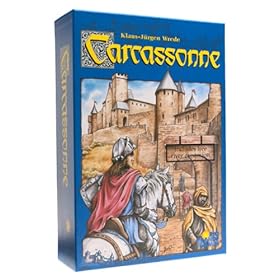
To be honest, I'm not really sure how well Carcassonne translates for younger audiences. But for anyone older than 12, this is fun tile-based game requiring strategy and risk-assessment. There is an element of luck about it, but it's much more about interaction with others and your ability to understand complex land values.
7) Boggle
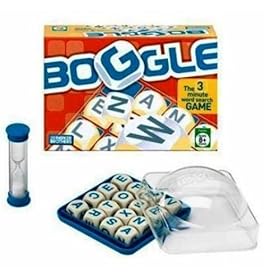
Boggle! One of my absolute favorite word games! Boggle combines reading, spelling, and pattern identification with speed (though you can get rid of the timer if you don't feel like being competitive). Extended boards are available for more advanced players. Younger players can expand their vocabulary and also start learning about prefixes and suffixes. And when the Boggle grid starts feeling too confined, you can take the letter dice out and use the dice to make your own word games.
6) 24
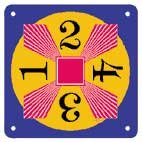
You don't even have to go out and BUY 24 to play it. Just get yourself a piece of paper, choose 4 integers and get cracking! The point of the game is to use basic math operations (+,-,/,*) with the numbers to get a result of 24. Older students can also use powers and roots or larger numbers. This is among my favorite math games and it can be dressed up or dressed down for any age.
5) The aMAZEing Labyrinth

When people think "Labyrinth", a lot of them think of David Bowie, or that weird, frustrating marble game where you have to get your marble through the maze. This puzzle game is far more intriguing than even David Bowie. Use the tiles to set up a grid board of hallways and items. with one extra tile, you push the halls around to get your piece to the treasures. This game is great for developing your spacial skills. There's a little bit of luck and a whole lot of logic. Depending on how the pieces are arranged, the game can range from very simple to maddeningly difficult.
4) Set
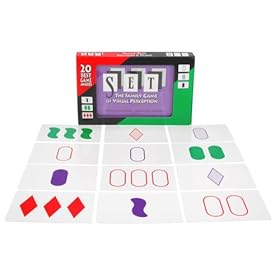
This game is great for pattern recognition. You've got 12 cards on the table and all of them are different. Can you find 3 where all their characteristics are similar or different. This is also a great game to help teach very basic skills for understanding "same" and "different". As kids get older, you can adapt the game to be more challenging by relying on speed.
3) Once Upon a Time
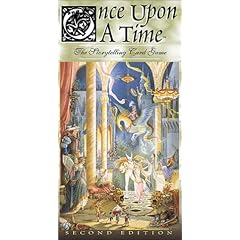
You have a kid, and they love stories at bed time. Actually, they love stories ANY time. How about a game that gets them to use their imagination and lets them make their own story in the process? Once Upon a Time is a card game that has a number of motifs and themes classic to fairy tales and fables. Each card has an element of a story; either a plot point, a character, a location, and so on. Your job is to use all your cards to create a cohesive and entertaining story. Kids as young as 6 will enjoy making their own stories. You can help your kids out by writing down their stories as you go along so they can read them at bed time in the future!
2) Mancala
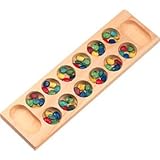
A simple game but not for the faint of heart. Also not for very young children as there are a lot of small pieces. I've played Mancala with a variety of different rules, and each new set of rules requires a different adaptation to win. Try to get all the marbles in your own bank, and steal the marbles from under your opponent's nose. No luck here. All skill.
1) Quarto
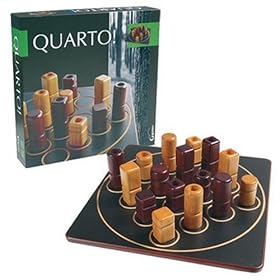
Quarto is not only a fantastic game to exercise your mind. It's also beautiful. With 16 carved wooden pieces and 1 wooden board, minimalism is the idea here, and although the set can be heavy to carry around, it's a nice addition to a trip to the beach. Consider Quarto when you're concerned about getting sand in your Scrabble set. Quarto's 16 different pieces (like Set) are all different. They are light, dark, tall, short, round, square, solid, and hollow. Your job is to get any four in a row on the board with a similar characteristic. The catch? You choose the piece your opponent places on the board and vice-versa. You can teach the basic concepts of this game to children as young as 5 or 6. And by the time the child reaches 9 or 10, you can begin to introduce the concept of strategy. A gem.
So, enjoy these games. Go out there and better yourself! Click on the links below to go to the Amazon product page. And if there's any game you think that I'm out of my mind to have excluded, put it in the comments! I want to know what else is out there!
Fluxx
Bananagrams
Carcassonne
Boggle
24
The aMAZEing Labyrinth
Set
Once Upon a Time
Mancala
Quarto
